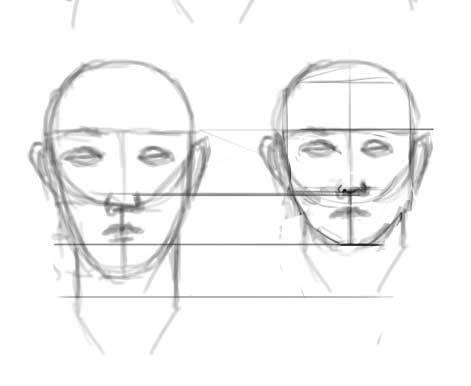I'm gonna tell you something I wish I did when I was getting that initial complete beginner mileage. My best studies always had a way of checking. Take any face. I'm assuming you're getting these off of pixelovely? Copy the image, and move it into photoshop. Give yourself 2 minutes for the initial lay in. Don't be discouraged if it takes longer than two minutes for your lay in, just do it over again and do not rush the process until you get some lay in that looks correct. Keep in mind that your goal is to get the size of your lay in equal to the size of your photo. Once your lay ins look correct, add a transparent layer and compare the two. You may use red to place in your corrections, or you may mentally note them. Focus on fixing the biggest mistake in your next lay in. Do not be discouraged if this takes multiple attempts to even match the last one, as your last lay in was your best of many. Rinse and repeat until you have a lay in you're satisfied with.
I personally recommend taking an approach similar to Loomis's for the head, as described here by Proko:
https://www.youtube.com/watch?v=1EPNYWeEf1U
The reason why is to aid the artist in having a structure to work with from imagination, and your depiction of the forms on top of this guide helps more easily build your visual library.
With your lay in that you're satisfied with, you may either take a fully 2d approach to try to really see the forms as they are, focusing on going from the big forms to the smaller forms or work in a more constructive manner, placing geometrics in perspective according to how they should interlock given the form of the skull. I'd personally recommend the fully 2d approach until you want to start working a lot more from imagination, in which a study of the skull for long term remembrance should become important.
Do not take too long with each drawing, if you see big mistakes after the fact it's generally better to just start over and attempt it again fresh focusing on correcting that mistake rather than trying to correct it on the same image. Oftentimes the mistake may not be what you expected. Loomis describes this a touch in Drawing The Head and Hands in that people may add more chin when the relationship between the end of the nose and the lips are wrong or etc.
Take this all with a grain of salt, as a skeptic. Try some of it out and see what does and doesn't work after an honest effort. Anyone with more expertise reading this please correct anything you feel to be incorrect in this post.
![[Image: girl.jpg]](http://i29.photobucket.com/albums/c281/Chromat/girl.jpg)
![[Image: girl.jpg]](http://i29.photobucket.com/albums/c281/Chromat/girl.jpg)








![[Image: practice%202.jpg]](http://i29.photobucket.com/albums/c281/Chromat/practice%202.jpg)
![[Image: practice%201.jpg]](http://i29.photobucket.com/albums/c281/Chromat/practice%201.jpg)

![[Image: heads%201.jpg]](http://i29.photobucket.com/albums/c281/Chromat/heads%201.jpg)
![[Image: practice%203.jpg]](http://i29.photobucket.com/albums/c281/Chromat/practice%203.jpg)

![[Image: practice%204.jpg]](http://i29.photobucket.com/albums/c281/Chromat/practice%204.jpg)
![[Image: practice%205.jpg]](http://i29.photobucket.com/albums/c281/Chromat/practice%205.jpg)
![[Image: practice%206.jpg]](http://i29.photobucket.com/albums/c281/Chromat/practice%206.jpg)
![[Image: practice%207.jpg]](http://i29.photobucket.com/albums/c281/Chromat/practice%207.jpg)
![[Image: Loomis1.jpg]](http://i29.photobucket.com/albums/c281/Chromat/Loomis1.jpg)